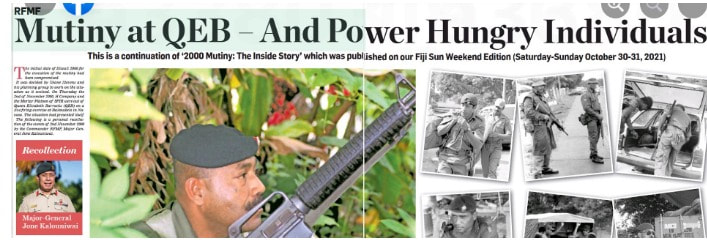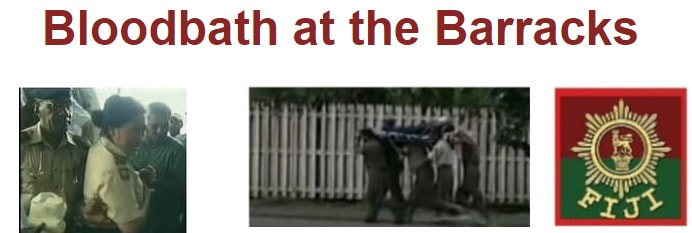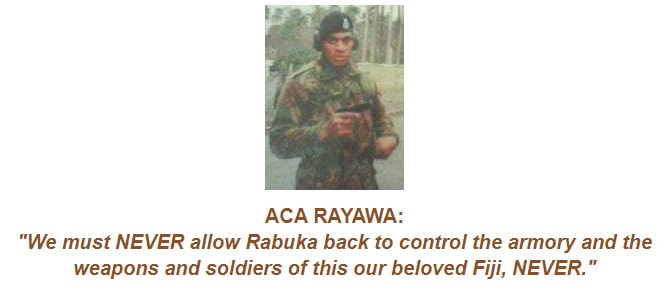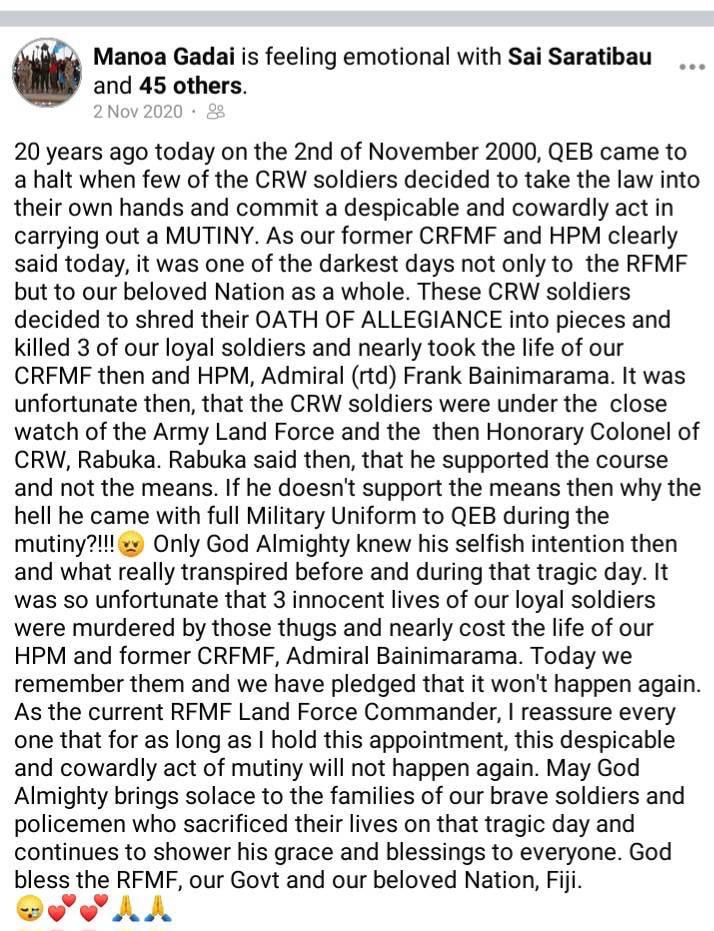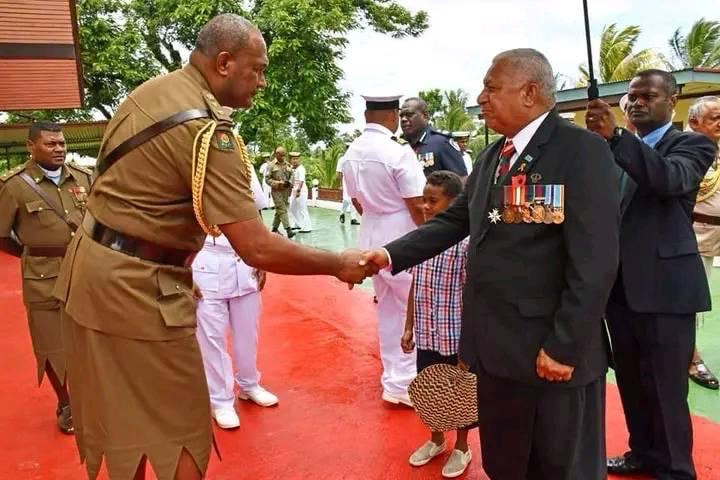STAY OUT: The military should NOT have agreed to entertain Sitiveni Rabuka at the barracks just because he is NOW the Prime Minister.
Whatever spin Pio Tikodudua churns out, the Military is SPLIT.
*FAKE CANCER TREATMENT? Responding to Tikoduadua, GRAHAM DAVIS on his Grubsheet Facebook makes a very disturbing allegation relating to why Tikoduadua had quit the FFP government:
'He [Tikoduadua] has been party to misrepresentation before when under the Bainimarama government, he allowed Frank and Aiyaz to get away with the lie that he was leaving for medial reasons when his departure was purely political'
From Fijileaks Archives, and the Ghai Commission Submission
Past Constitution Allowed The Events of November 2000
In 2000, the RFMF made all attempts to thwart the Coup and its progression. A daunting task indeed, as there were few in authority present then to help the RFMF in their efforts. A lot of party leaders and followers bolted out of the country as soon as trouble struck. Others had gone into hiding, not to be heard or seen in the public domain for months after the 2000 events.
No statements were made by Unionist, or political leaders for the right of Fijians. The RFMF looked towards our chiefs and church leaders, especially the Methodist Church to assist in the country’s return to normalcy. These were the two groups who were supposed to have the interest for all Fijian at all times come to assist the RFMF. Unfortunately, at a time of real need, both our chiefs and the Christian Church Padres were already in Parliament supporting the rebel group.
The Christian Church who was supposed to be preaching tolerance and praying for the well being of the people of Fiji, were instead praying for the demise of the RFMF and Fiji. The fact that there was no one present to assist and support the RFMF in 2000, and, the subsequent killing of soldiers in the 02 November mutiny, had challenged, motivated and inspired the RFMF to continue with its reform effort despite all opposition.
In the time of crisis and adversities, the RFMF stood alone but persevered in its efforts to bring about a harmonious and a new Fiji. The RFMF was abandoned by the Chiefs, by the Methodist Church, by the political parties, by the traded unionist, and by our neighboring States at a time when support was critically needed. It is also demeaning to think that these groups now claim to know better on how the RFMF should be structured or how Government should run.
It is simple, either you support the RFMF in its reforms and effort to bring about peace and stability within Fiji or support the contrary, which is corruption, racial and ethnic division, racial hatred, undermining of the under privileged, social injustice etc. Surprisingly a lot of individuals, including trade unionists, who have presented submissions to the Commission have voiced dissent to the present Government and RFMF, have once or on numerous occasions visited the RFMF to pledge their support for Commodore Bainimarama when they were given appointments in Government or Boards of Government Subsidiary Companies.
How convenient, that when they had occupied Board Memberships, or positions within Government, the present Government and the RFMF was right. However, as soon as they lost their Board positions and the benefits that came with the position, the Government and the RFMF became wrong. As long as their agenda and self interest were served, their loyalty remained. As soon as the money went- so did their loyalty and support!
Mutiny at SVC Barracks, Labasa, and Attempts to Remove Commander Republic of Fiji Military Forces
As the events of May 2000 unfolded, RFMF desperately tried to maintain stability within the country. The Forces and its resources were stretched to the limit having to cope with the demand of having to secure strategic positions throughout Fiji while at the same time trying to convince the public to have confidence in us. In the face of all these and on 04 July 2000, some fifty six (56) service personnel including two (2) officers took over the Sukanaivalu Victoria Cross Barracks in Labasa.
Soldiers involved were reported to have been incited by George Speight and Ilisoni Ligairi to take over the camp and demand the removal of Commodore Bainimarama as Commander of the Forces. The mutineers gained the support of local Chiefs like Ratu Jo Dimuri, Tui Nadogo – Ratu Viliame Rovabokola, Tui Labasa Ratu J. Ritova and the Tui Cakau Ratu Naiqama Lalabalavu.
During the takeover, civilians were terrorised, shot at and intimidated. Labasa Police Station was invaded, taken over and police officers were detained and assaulted. The takeover of the camp lasted some 30 days with wide spread disorder in the Northern Division. The Sukanaivalu Victoria Cross Barracks was finally retaken by a Task Force from Suva.
All fifty six (56) servicepersons who were involved have been convicted for mutiny and are currently serving or have served prison sentences in Suva. The chiefs who supported them were charged for criminal offences in the Labasa Magistrates Court and received light, non-custodial sentences. Again, what became apparent was that the plot by George Speight and his Group with the support of the chiefs and the churches was to undermine military efforts and to destabilize it.
The loyalty of the officers and men was put to the test when they stood by the Commander in ensuring that the integrity of the military remains intact in such difficult operations under difficult conditions. Vanua Revolts and
Attempts to Destabilize the Republic of Fiji Military Forces
For an insight into May 2000 upheaval and its effect, the Vanua revolts around the country at the time would have to be highlighted in light of the many difficulties encountered by the Forces. Saddening to say, that while RFMF was attempting to stabilize the chaotic situation, some prominent members of our community were plotting to subvert almost all aspects of military operations.
On Tuesday 4 July, 2000, despite undue pressure from the George Speight Group, Mr Laisenia Qarase was sworn in as leader of the Interim Government. Following this pronouncement, there was a exchange of gunfire outside parliament which compelled the RFMF to establish a military exclusive zone with the area. In the days that followed, the landowners disrupted power supplies around Viti Levu by sabotaging the flow of water into the Wailoa Power Station.
Furthermore, villagers from Naivucini in Naitasiri closed off all access roads to the Monasavu Hydro Dam. The worst to come was the armed take- over of Korovou Town by individuals led by Varinava Tiko. In the process, soldiers and police officers were taken hostage. 30. Simultaneously, the situation in the West became volatile when chiefs and people of Sabeto led by Apisai Tora resolved to close off the Queens Highway and sealed off excess to Sabeto Police Station.
These are a few of the many incidents involving some chiefs and their followers who made attempts to destabilise the Forces aimed solely at undermining military operations. Again, these misguided Vanua Revolts were instigated and led by rogue chiefs and certain individuals. At a time when the Vanua, the chiefs and people failed to come together to support our efforts in restoring law and order, the RFMF was made to stand alone and defend this country from total anarchy.
Mutiny at Queen Elizabeth Barracks, Nabua
On the morning of 2nd November 2000, some thirty eight (38) Counter Revolutionary Warfare (CRW) Unit members, including two from the Third Infantry Regiment attempted to takeover Queen Elizabeth Barracks with the main purpose of removing Commodore Bainimarama as Commander of the Republic of Fiji Military Forces.
The incident, which lasted approximately seven hours, saw the takeover of strategic positions within the Camp including the taking of hostages. In the process of executing the mutiny, unarmed loyal troops were fired upon, indiscriminately.
As a result of the mutiny, eight lives were lost. What became apparent was that the majority of the officers and men stood by the Commander. All endeavors were made to retake the camp and protect the status quo of our proud institution.
Following the mutiny, General Court Martial proceedings commenced hearing cases against all thirty-eight service persons. Of the thirty-eight, of those involved including three (3) officers are now serving or have served prison sentences after being found guilty of mutiny.
One important revelation that was made during the inquiry and trials was the involvement of politicians and prominent leaders like Ratu Inoke Takiveikata, who has been tried and convicted in the civil court for inciting mutiny.
THE ROLE OF THE REPUBLIC OF FIJI MILITARY FORCES
The RFMF pursuant to Section 94(3) of the 1990 Constitution entrusted with: “the responsibility ….. to ensure at all times the security, defence and well being of Fiji and its people”.
Section 112(1) of the 1997 Constitution has recognized these provisions. It reads as follows:
Republic of Fiji Military Forces 112.-
(1) The military force called the Republic of Fiji Military Forces established by the Constitution of 1990 continues in existence.
(2) The President, acting on the advice of the Minister, must appoint a Commander of the Republic of Fiji Military Forces to exercise military executive command of the Forces, subject to the control of the Minister.
(3) The Commander of the Republic of Fiji Military Forces is responsible for:
a. making appointments of members of the Forces;
b. taking disciplinary action against members of the Forces; and c. removing members from the Forces.
(4) The Parliament may make laws relating to the Republic of Fiji Military Forces.
We submit that the new constitution should reflect the responsibility given to the Forces through Section 94(3) of the 1990 Constitution and fully recognized through Section 112(1) of the 1997 Constitution
In 2000, the RFMF made all attempts to thwart the Coup and its progression. A daunting task indeed, as there were few in authority present then to help the RFMF in their efforts. A lot of party leaders and followers bolted out of the country as soon as trouble struck. Others had gone into hiding, not to be heard or seen in the public domain for months after the 2000 events.
No statements were made by Unionist, or political leaders for the right of Fijians. The RFMF looked towards our chiefs and church leaders, especially the Methodist Church to assist in the country’s return to normalcy. These were the two groups who were supposed to have the interest for all Fijian at all times come to assist the RFMF. Unfortunately, at a time of real need, both our chiefs and the Christian Church Padres were already in Parliament supporting the rebel group.
The Christian Church who was supposed to be preaching tolerance and praying for the well being of the people of Fiji, were instead praying for the demise of the RFMF and Fiji. The fact that there was no one present to assist and support the RFMF in 2000, and, the subsequent killing of soldiers in the 02 November mutiny, had challenged, motivated and inspired the RFMF to continue with its reform effort despite all opposition.
In the time of crisis and adversities, the RFMF stood alone but persevered in its efforts to bring about a harmonious and a new Fiji. The RFMF was abandoned by the Chiefs, by the Methodist Church, by the political parties, by the traded unionist, and by our neighboring States at a time when support was critically needed. It is also demeaning to think that these groups now claim to know better on how the RFMF should be structured or how Government should run.
It is simple, either you support the RFMF in its reforms and effort to bring about peace and stability within Fiji or support the contrary, which is corruption, racial and ethnic division, racial hatred, undermining of the under privileged, social injustice etc. Surprisingly a lot of individuals, including trade unionists, who have presented submissions to the Commission have voiced dissent to the present Government and RFMF, have once or on numerous occasions visited the RFMF to pledge their support for Commodore Bainimarama when they were given appointments in Government or Boards of Government Subsidiary Companies.
How convenient, that when they had occupied Board Memberships, or positions within Government, the present Government and the RFMF was right. However, as soon as they lost their Board positions and the benefits that came with the position, the Government and the RFMF became wrong. As long as their agenda and self interest were served, their loyalty remained. As soon as the money went- so did their loyalty and support!
Mutiny at SVC Barracks, Labasa, and Attempts to Remove Commander Republic of Fiji Military Forces
As the events of May 2000 unfolded, RFMF desperately tried to maintain stability within the country. The Forces and its resources were stretched to the limit having to cope with the demand of having to secure strategic positions throughout Fiji while at the same time trying to convince the public to have confidence in us. In the face of all these and on 04 July 2000, some fifty six (56) service personnel including two (2) officers took over the Sukanaivalu Victoria Cross Barracks in Labasa.
Soldiers involved were reported to have been incited by George Speight and Ilisoni Ligairi to take over the camp and demand the removal of Commodore Bainimarama as Commander of the Forces. The mutineers gained the support of local Chiefs like Ratu Jo Dimuri, Tui Nadogo – Ratu Viliame Rovabokola, Tui Labasa Ratu J. Ritova and the Tui Cakau Ratu Naiqama Lalabalavu.
During the takeover, civilians were terrorised, shot at and intimidated. Labasa Police Station was invaded, taken over and police officers were detained and assaulted. The takeover of the camp lasted some 30 days with wide spread disorder in the Northern Division. The Sukanaivalu Victoria Cross Barracks was finally retaken by a Task Force from Suva.
All fifty six (56) servicepersons who were involved have been convicted for mutiny and are currently serving or have served prison sentences in Suva. The chiefs who supported them were charged for criminal offences in the Labasa Magistrates Court and received light, non-custodial sentences. Again, what became apparent was that the plot by George Speight and his Group with the support of the chiefs and the churches was to undermine military efforts and to destabilize it.
The loyalty of the officers and men was put to the test when they stood by the Commander in ensuring that the integrity of the military remains intact in such difficult operations under difficult conditions. Vanua Revolts and
Attempts to Destabilize the Republic of Fiji Military Forces
For an insight into May 2000 upheaval and its effect, the Vanua revolts around the country at the time would have to be highlighted in light of the many difficulties encountered by the Forces. Saddening to say, that while RFMF was attempting to stabilize the chaotic situation, some prominent members of our community were plotting to subvert almost all aspects of military operations.
On Tuesday 4 July, 2000, despite undue pressure from the George Speight Group, Mr Laisenia Qarase was sworn in as leader of the Interim Government. Following this pronouncement, there was a exchange of gunfire outside parliament which compelled the RFMF to establish a military exclusive zone with the area. In the days that followed, the landowners disrupted power supplies around Viti Levu by sabotaging the flow of water into the Wailoa Power Station.
Furthermore, villagers from Naivucini in Naitasiri closed off all access roads to the Monasavu Hydro Dam. The worst to come was the armed take- over of Korovou Town by individuals led by Varinava Tiko. In the process, soldiers and police officers were taken hostage. 30. Simultaneously, the situation in the West became volatile when chiefs and people of Sabeto led by Apisai Tora resolved to close off the Queens Highway and sealed off excess to Sabeto Police Station.
These are a few of the many incidents involving some chiefs and their followers who made attempts to destabilise the Forces aimed solely at undermining military operations. Again, these misguided Vanua Revolts were instigated and led by rogue chiefs and certain individuals. At a time when the Vanua, the chiefs and people failed to come together to support our efforts in restoring law and order, the RFMF was made to stand alone and defend this country from total anarchy.
Mutiny at Queen Elizabeth Barracks, Nabua
On the morning of 2nd November 2000, some thirty eight (38) Counter Revolutionary Warfare (CRW) Unit members, including two from the Third Infantry Regiment attempted to takeover Queen Elizabeth Barracks with the main purpose of removing Commodore Bainimarama as Commander of the Republic of Fiji Military Forces.
The incident, which lasted approximately seven hours, saw the takeover of strategic positions within the Camp including the taking of hostages. In the process of executing the mutiny, unarmed loyal troops were fired upon, indiscriminately.
As a result of the mutiny, eight lives were lost. What became apparent was that the majority of the officers and men stood by the Commander. All endeavors were made to retake the camp and protect the status quo of our proud institution.
Following the mutiny, General Court Martial proceedings commenced hearing cases against all thirty-eight service persons. Of the thirty-eight, of those involved including three (3) officers are now serving or have served prison sentences after being found guilty of mutiny.
One important revelation that was made during the inquiry and trials was the involvement of politicians and prominent leaders like Ratu Inoke Takiveikata, who has been tried and convicted in the civil court for inciting mutiny.
THE ROLE OF THE REPUBLIC OF FIJI MILITARY FORCES
The RFMF pursuant to Section 94(3) of the 1990 Constitution entrusted with: “the responsibility ….. to ensure at all times the security, defence and well being of Fiji and its people”.
Section 112(1) of the 1997 Constitution has recognized these provisions. It reads as follows:
Republic of Fiji Military Forces 112.-
(1) The military force called the Republic of Fiji Military Forces established by the Constitution of 1990 continues in existence.
(2) The President, acting on the advice of the Minister, must appoint a Commander of the Republic of Fiji Military Forces to exercise military executive command of the Forces, subject to the control of the Minister.
(3) The Commander of the Republic of Fiji Military Forces is responsible for:
a. making appointments of members of the Forces;
b. taking disciplinary action against members of the Forces; and c. removing members from the Forces.
(4) The Parliament may make laws relating to the Republic of Fiji Military Forces.
We submit that the new constitution should reflect the responsibility given to the Forces through Section 94(3) of the 1990 Constitution and fully recognized through Section 112(1) of the 1997 Constitution


